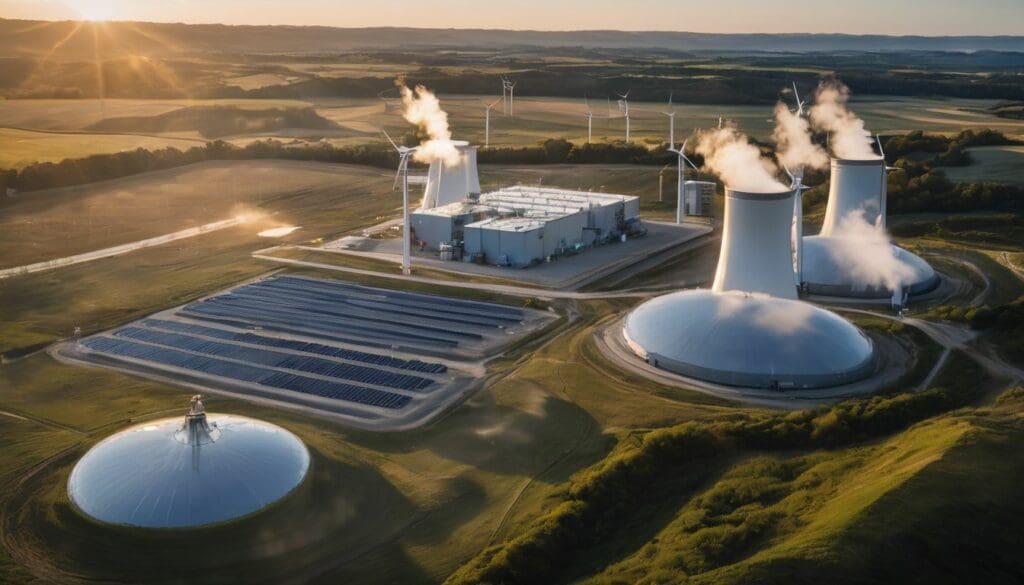As we all search for ways to move away from fossil fuels, hydrogen energy is stepping into the spotlight. In the UK alone, hydrogen has the potential to meet up to 35% of energy demand by 2050.
This blog will explore how embracing hydrogen can reshape our energy landscape and contribute to a greener future. Discover the possibilities with us!
Key Takeaways
- Hydrogen energy could supply up to 35% of the UK’s energy demand by 2050, with government initiatives driving advancements and adoption across various sectors such as transport and industry.
- The UK will implement new regulations that support hydrogen production and integration into public transport, industrial processes, and renewable energy systems, advancing the country’s decarbonisation efforts.
- Technological breakthroughs in machine learning are optimising green energy sources while district heating with heat pumps and smart lighting solutions enhance efficiency. Solar power technologies continue to evolve for greater effectiveness.
- International cooperation through partnerships is enhancing technological advancement in hydrogen energy; this collaboration is key to achieving global decarbonisation goals.
- Upcoming projects and conferences offer platforms for stakeholders in hydrogen energy to collaborate and share advancements, including a focus on addressing challenges within the sector.
The current state of Hydrogen Energy in the UK
The UK’s energy system is evolving, with upcoming regulation changes prioritising decarbonisation. This opens the door for the potential of hydrogen energy to play a significant role in shaping the country’s future energy landscape.
Evolution of the UK’s energy system
Over the past decades, shifts in the UK’s energy landscape have been profound. Coal, once the backbone of British power, has given way to cleaner alternatives. Wind farms now dot the horizon and solar panels capture sunlight, signalling a drive towards renewable energy sources.
Innovative technologies like hydrogen generators are being developed to support this green revolution.
Changing regulations and growing environmental awareness have accelerated the move from fossil fuels to sustainable energy options. Low-carbon hydrogen has emerged as a promising contender in reducing carbon emissions and aiding in climate change mitigation.
This transition is not just about producing energy but transforming how it’s consumed—fuel cells for cars, clean energy for homes, and alternative fuel for industries are all part of an evolving system designed to secure a greener future for the country.
Upcoming regulation changes
The UK is set to implement significant regulation changes related to hydrogen energy. These changes are aimed at driving the adoption and integration of hydrogen technology across various sectors, including:
- Incentives for green hydrogen production to support decarbonisation efforts.
- Integration of fuel cells in public transportation to reduce emissions and improve air quality.
- Implementation of regulations promoting the use of hydrogen in industrial processes, reducing reliance on fossil fuels.
Global perspective
The global perspective on hydrogen energy includes partnerships and collaborations between countries to advance the use of this alternative energy source. It’s important to consider how the UK fits into the international landscape of green energy development.
Partnerships and collaborations between countries
Countries around the world are forming partnerships and collaborations to advance hydrogen energy. Through joint research, investment, and knowledge sharing, nations can accelerate the development of green energy solutions.
These alliances play a crucial role in enhancing technological advancements, promoting sustainable practices, and achieving global decarbonisation goals. Encouraging international cooperation fosters a more robust hydrogen economy and paves the way for effective energy transition strategies.
As countries unite to address environmental challenges collectively, significant progress is being made toward creating a greener future for generations to come. By working together on projects such as rapid infrastructure expansion and renewable energy integration, nations are driving the shift towards alternative energy sources like hydrogen.
Technological advancements
The UK is seeing technological advancements in machine learning, district heating with heat pumps, smart integrated lighting solutions, and next-generation solar power. Read more to discover the potential of these advancements in driving hydrogen energy forward in the UK.
Machine learning and green energy breakthroughs
Machine learning and green energy breakthroughs have revolutionised the renewable energy sector, enhancing efficiency and sustainability. Advanced algorithms are optimising power grid operations, reducing wastage, and increasing the integration of clean energy sources.
These innovations are crucial for achieving decarbonisation goals set out in the Energy Act, driving progress towards a greener future.
Cutting-edge technologies developed through machine learning and green energy breakthroughs are pivotal in realising the UK’s commitment to reducing carbon emissions. By leveraging these advancements, the country can further accelerate its transition towards renewable energy while fostering environmental conservation.
District heating with heat pumps
Transitioning from machine learning and green energy breakthroughs, let’s delve into the realm of district heating with heat pumps. Using renewable energy sources like air, water, or underground warmth, heat pumps efficiently transfer heat to provide heating and hot water for residential and commercial properties.
By embracing this technology, we can significantly reduce carbon emissions and contribute to a more sustainable future.
District heating with heat pumps offers an innovative solution for environmentally conscious individuals looking to support conservation efforts. These systems are paving the way for cleaner, more efficient heating solutions that align with the UK’s decarbonisation goals.
Smart integrated lighting and control solutions
Smart integrated lighting and control solutions maximise energy efficiency in buildings. By using advanced technologies, such as motion sensors and smart controls, these systems adjust lighting levels based on natural light availability and occupancy.
This not only reduces energy consumption but also lowers carbon emissions, aligning with the goal of decarbonising the UK’s energy system.
Enhancing environmental sustainability through intelligent lighting can significantly contribute to lowering overall energy usage in commercial and residential properties. Implementing these solutions supports conservation efforts while promoting a greener future for the UK’s energy landscape.
Solar farms and next-generation solar power
Moving on from smart integrated lighting and control solutions, let’s delve into the topic of solar farms and next-generation solar power. Solar farms are large-scale installations that harness the sun’s energy to generate electricity.
With advancements in technology, next-generation solar power systems are becoming more efficient and cost-effective. These developments have significantly contributed to the growth of renewable energy sources in the UK, aligning with the country’s sustainability goals.
The integration of advanced technologies such as bifacial solar panels, high-efficiency photovoltaic cells, and innovative tracking systems has revolutionised the output potential of solar farms.
Utilising hydrogen for different applications
Hydrogen energy can be utilised for transportation revolution, heating systems, industrial use, integration with renewable energy, and export opportunities. These applications showcase the versatility and potential impact of hydrogen as a sustainable energy source in the UK.
Transportation revolution
Hydrogen energy is spearheading a transportation revolution in the UK, promising to significantly reduce carbon emissions from vehicles. By utilising hydrogen fuel cells, buses and trains are being powered with zero-emission technology, offering a sustainable alternative to traditional fossil fuel-based transport.
This shift towards hydrogen-powered transportation aligns with the collective effort to combat climate change and create a cleaner environment for future generations.
As we explore the potential of hydrogen energy in the UK, it’s essential to consider its impact on various aspects of everyday life beyond just transportation. Let’s dive into how this remarkable energy source can transform heating systems, industrial processes, integration with renewable energy, and export opportunities for the country’s economy.
Heating systems
Transitioning from the innovations in transportation to heating systems, it’s crucial to highlight the significance of clean energy. Green hydrogen has a pivotal role to play in decarbonising heating systems, offering a sustainable alternative for environmentally conscious individuals.
Implementing hydrogen-powered boilers and fuel cells can significantly reduce carbon emissions and pave the way for cleaner, more efficient home heating solutions.
The integration of green hydrogen into heating systems presents an opportunity for individuals committed to supporting conservation efforts. By embracing this technology, consumers can actively contribute to environmental preservation while enjoying the benefits of reliable and eco-friendly home heating.
Industrial use
Hydrogen energy holds immense potential for industrial applications in the UK. It can be deployed for manufacturing processes, such as steel production and chemical refining, providing a sustainable alternative to traditional fossil fuel-based operations.
Implementing hydrogen in industries contributes to reducing carbon emissions, making significant strides towards environmental conservation.
Furthermore, integrating hydrogen into industrial use not only promotes cleaner energy but also enhances operational efficiency. By leveraging hydrogen technologies, industries can reduce their reliance on non-renewable resources and minimise their environmental impact while supporting conservation efforts.
Integration with renewable energy
Renewable energy sources like wind and solar power can be effectively integrated with hydrogen technology to produce clean and sustainable energy. This integration allows excess renewable energy, which is often generated during off-peak hours, to be stored in the form of hydrogen through a process called electrolysis.
This stored hydrogen can then be used during peak demand periods or when renewable energy sources are not readily available, providing a reliable and consistent supply of green energy.
By combining these technologies, we can create an efficient and flexible energy system that reduces carbon emissions while supporting the growth of renewable energy infrastructure.
Moreover, the integration of hydrogen with renewable energy offers a solution to the intermittency challenge faced by many renewable resources. It enables a more stable and balanced grid operation by leveraging hydrogen as an important storage medium for surplus electricity produced from renewables.
Export opportunities
Hydrogen energy in the UK presents exciting export opportunities for environmentally conscious individuals. The increasing demand for clean energy solutions worldwide creates avenues for exporting hydrogen technologies and expertise to other countries, fostering international collaboration and driving global sustainability efforts.
As we explore the potential of hydrogen energy, it’s essential to consider its impact on different applications while identifying key export opportunities. Looking ahead, let’s delve into the path forward for hydrogen energy in the UK by examining its potential growth, government initiatives, investments, and upcoming projects.
The path forward for Hydrogen Energy in the UK
The potential for growth and development in the UK’s hydrogen energy industry is promising, with government initiatives and investments paving the way for a sustainable future. Addressing challenges and misconceptions will be crucial to unlocking the full potential of this clean energy source.
Potential for growth and development
Hydrogen energy holds substantial potential for growth and development in the UK, paving the way for a cleaner, more sustainable future. As technology continues to advance, there are increasing opportunities to harness hydrogen’s power across various applications.
Embracing this renewable energy source has the potential to drive innovation and create new job opportunities in the green economy. With government initiatives and investments geared towards promoting hydrogen energy, it is evident that the path forward is laden with promise.
Moreover, addressing challenges and misconceptions surrounding hydrogen’s viability can further propel its integration into existing energy systems. This burgeoning sector also offers significant export opportunities on a global scale, positioning the UK as a key player in advancing environmental conservation efforts.
Government initiatives and investments
The UK government has allocated substantial funds to support hydrogen energy initiatives, aiming to reduce carbon emissions and promote sustainability. This includes:
- Funding research and development projects to advance hydrogen production technologies and infrastructure.
- Investing in hydrogen refueling stations to facilitate the transition to hydrogen-powered transportation.
- Providing financial incentives for businesses to adopt hydrogen-based heating systems for industrial and commercial applications.
- Collaborating with industry partners to develop offshore wind farms that produce green hydrogen for export opportunities.
- Supporting the integration of renewable energy sources with hydrogen storage solutions to enhance grid stability and resilience.
Addressing challenges and misconceptions
Hydrogen energy faces certain challenges and misconceptions that need to be addressed. One of the primary concerns is the cost of producing hydrogen, which traditionally has been high due to fossil fuel-based production methods.
However, advancements in renewable energy sources like wind and solar are making green hydrogen production more feasible and cost-effective. Another misconception is the safety of hydrogen as a fuel source, but with stringent regulations and advanced storage technologies, it can be used safely.
Educating about these developments will help dispel myths and encourage wider acceptance of hydrogen as a clean energy alternative.
An additional challenge lies in infrastructure development for widespread adoption of hydrogen energy. Constructing facilities for large-scale production, distribution, and refueling stations requires significant investment; however, strategic government initiatives can drive this forward.
Upcoming projects and conferences
The future of hydrogen energy in the UK is set to be showcased at various upcoming projects and conferences, providing a platform for stakeholders and enthusiasts to collaborate. These events will highlight technological advancements, government initiatives, and investment opportunities within the renewable energy sector.
With a focus on addressing challenges and misconceptions while promoting growth and development, these gatherings are essential for those passionate about environmental conservation.
Engaging with like-minded individuals at upcoming projects and conferences can offer valuable insights into utilising hydrogen for transportation revolution, heating systems, industrial use, integration with renewable energy, and export opportunities.
Conclusion.
Moving forward, the potential of hydrogen energy in the UK is promising, with ongoing advancements and collaborations on a global scale. As environmentally conscious individuals supporting conservation and environmental initiatives, it’s crucial to stay informed about the evolution of the UK’s energy system and upcoming regulation changes.
Embracing technological breakthroughs in machine learning, district heating, smart lighting solutions, and next-generation solar power can help drive the integration of hydrogen into various applications like transportation revolution, heating systems, industrial use, and renewable energy.
Looking ahead, government initiatives and investments play a critical role in addressing challenges and misconceptions while opening doors for growth opportunities within this sustainable energy sector.
FAQs
1. Can hydrogen energy really power homes in the UK?
Yes, hydrogen energy can be used to power homes in the UK.
2. Is hydrogen a clean source of energy?
Hydrogen is considered a clean source of energy when produced from renewable resources.
3. What are the benefits of using hydrogen for transportation?
Using hydrogen for transportation can reduce pollution and reliance on fossil fuels.
4. Is it safe to use hydrogen as an energy source?
Yes, with proper safety measures and technology, it is safe to use hydrogen as an energy source.
5. Are there any existing hydrogen projects in the UK right now?
The UK has several ongoing projects aimed at increasing the use of hydrogen in various sectors such as transport and industry.





